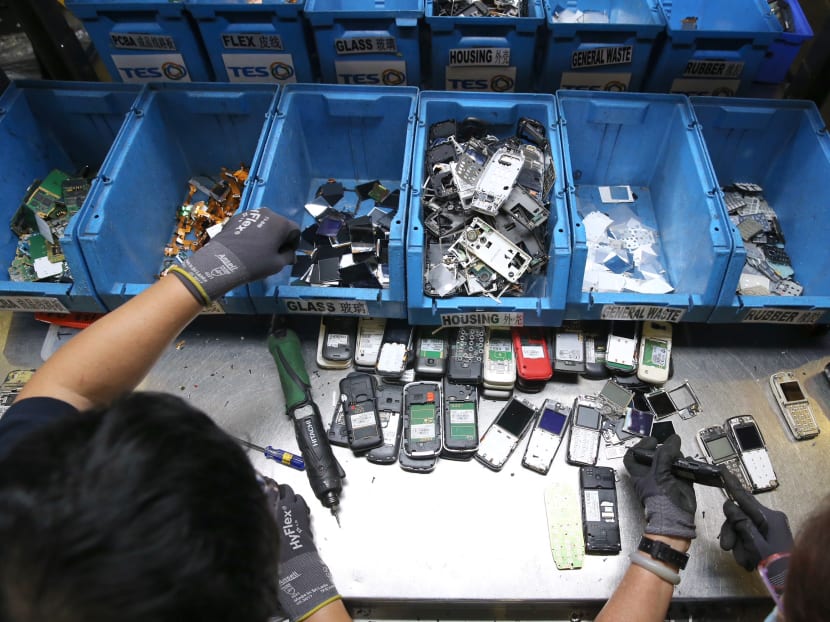Only 6 per cent of domestic e-waste ends up in recycling bins: NEA study
SINGAPORE — Most Singaporeans know nothing or little about how to recycle their unwanted electrical or electronic goods, resulting in only about 6 per cent of domestic e-waste recycled and one-quarter thrown out with food and other general waste.

Demanufacturing works were seen at the demanufacturing area at the E-waste Recycling Facility at TES-AMM (Singapore) on Friday (Jan 19). Photo: Koh Mui Fong/TODAY
SINGAPORE — Most Singaporeans know nothing or little about how to recycle their unwanted electrical or electronic goods, resulting in only about 6 per cent of domestic e-waste recycled and one-quarter thrown out with food and other general waste.
Releasing key findings of an 18-month study on Friday (Jan 19), the National Environment Agency (NEA) found that three in five people in Singapore do not know, or are unsure of how to recycle e-waste.
Singapore generates more than 60,000 tonnes of e-waste each year – the weight of about 220 Airbus A380 superjumbo planes. Half of it is estimated to come from households. This means an individual here throws out about 11kg of e-waste each year.
The study – which surveyed 1,600 consumers and concluded in October last year – found that households recycle only 6 per cent of the estimated 30,000 tonnes of electrical and electronic goods thrown out every year.
Washing machines (32 per cent), refrigerators (27 per cent) and television sets (22 per cent) make up more than 80 per cent of the e-waste generated here. The remainder includes air-conditioners, computers, printers and mobile phones.
About one-quarter of household e-waste is thrown away with general waste or left at common areas. Another 24 per cent, usually the higher-value e-waste like mobile phones, are traded-in or sold.
More than one-third (35 per cent) — usually bulky items such as washing machines and refrigerators — are handed over to deliverymen by consumers collecting their new appliances.
But these items are not always properly disposed of. Some end up with “informal collectors” such as scrap traders and rag-and-bone men, said an NEA spokesperson.
The informal collectors would refurbish and resell the reusable items or trade in parts of the items with recyclers.
“Many of these collectors do not have the capability to maximise resource recovery from e-waste, and as a result, only components of significant value are recycled,” said the spokesperson.
They could endanger themselves and may discard potentially hazardous components with general waste. When e-waste is incinerated, the heavy metals also contaminate incineration ash.
There are only a handful of voluntary recycling programmes in Singapore, but they mostly collect portable e-waste. More than 400 bins are found islandwide under StarHub’s Renew programme and they collected about 93 tonnes of e-waste last year, for instance.
Singapore’s largest e-waste recycler TES-AMM collected about 12,200 tonnes of e-waste last year. About 20 to 30 per cent came from Singaporean consumers while the remainder was from its offices in other countries.
TES-AMM’s Benoi Sector facility can recycle different materials that are extracted from the e-waste, including copper, steel, plastic and even gold.
E-waste is a growing problem worldwide as new products are rapidly rolled out and demand for gadgets grows with increasing wealth and digitalisation. Yet, rare earth metals used to make tech gadgets are reportedly becoming scarcer.
A lot of energy and resources are used to make even small electronic devices and consumers should help in “preserving” them, said TES-AMM group chief operating officer Gary Steele.
Formal recyclers are also able to ensure personal data residing in the devices is not compromised while processing the e-waste, he said.






